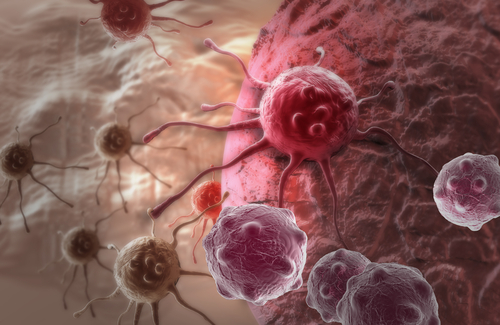The immune checkpoint molecules PD-L1 and TIM-3 have prognostic value in people with ovarian cancer who have not yet received chemotherapy. But while low levels of TIM-3 were linked to longer survival rates, a study unexpectedly showed that high levels of PD-L1 predicted better patient survival.
The findings also point to TIM-3 inhibitors as a potentially promising approach for those with ovarian cancer who have not yet received chemotherapy.
The study, “TIM-3 dictates functional orientation of the immune infiltrate in ovarian cancer,” was published in the journal Clinical Cancer Research.
It has become abundantly clear in recent years that the immune system plays a critical role in the development of cancer, scientists say. This has led to the idea that the immune status of an individual tumor — specifically, what kinds of immune cells are present, how many there are, and what markers they are expressing — can help to develop prognoses for patients.
Researchers now set out to clarify the roles of a number of immune cells and markers in high-grade serous carcinoma, the most common type of ovarian cancer.
They examined 80 tumor biopsies from ovarian cancer patients who had undergone surgery but had not been treated with chemotherapy. The biopsies were analyzed using immunohistochemistry — a technique in which antibodies against specific markers are used to stain a slide with tissue on it. This lets the investigator determine what cells are present, what proteins those cells are expressing, and where the cells are in relation to each other.
The researchers also analyzed transcriptomic data — information on what genes were being translated into RNA, which can indicate whether and how much a gene is “on” — for 308 tumors whose data is stored at The Cancer Genome Atlas, a database for cancer research. These data were used to double-check the findings from immunohistochemistry.
Many of the researchers’ findings were to be expected: for example, they found that people whose tumors had more T-cells lived longer, without their disease worsening, and had better overall survival rates. T-cells are the main cells responsible for killing cancer cells, so it’s not very surprising that more of them might indicate a more robust anti-cancer immune response, which would translate to longer survival.
Similarly, high levels of B-cells, which make antibodies, and dendritic cells — ones that ‘show’ molecular targets to immune cells, a process called antigen presentation — were correlated with better survival.
When the researchers looked at the immunological molecules being expressed in the tumor, though, they found some surprises. Cancer researchers often look at molecules called checkpoint inhibitors. These are molecules that cells can produce to signal to the immune system that they are working properly. However, cancer cells often hijack this system to shut down the immune response against the tumor.
Perhaps the most well-known checkpoint inhibitor is the molecule PD-L1, which binds to PD-1 on immune cells to “turn them off.” PD-1 is the target of some immunotherapies. Researchers expected that high levels of PD-L1 would be associated with poorer survival. But in this analysis, the opposite was true: patients whose tumors had high levels of this molecule tended to have longer survival rates.
The researchers said this result might be because this molecule is “indicative of an active … immune response that positively influences disease outcomes.” That means the molecules are only there because the immune system is already effectively fighting the tumor. Thus, the researchers suggest, patients with high levels may benefit particularly from immunotherapies that block PD-1, since there already is an active anti-tumor immune environment.
However, high levels of another checkpoint inhibitor — TIM-3, which is expressed by immune cells and similarly works to “turn them off” — were predictive of poor survival. That indicates “that TIM-3 has a prominent role in limiting immune responses against” ovarian cancers, the researchers said.
“Our data suggest that TIM-3 inhibitors should be tested [before or after surgery] for the management of chemotherapy-naive patients,” they concluded.

